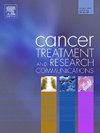The role of long non-coding RNAs in developing paclitaxel-resistant triple negative breast cancer: a systematic review
IF 2.4
Q3 Medicine
引用次数: 0
Abstract
Introduction
Recent evidence supports the idea that long non-coding RNAs (lncRNAs) are significantly involved in chemoresistance of breast cancer. This study aimed to systematically review the emerging role of lncRNAs in paclitaxel (PTX) resistance in triple-negative breast cancer (TNBC). Furthermore, the review summarized potential targets and the underlying mechanisms of lncRNAs to induce or reverse the resistance of TNBC cells to PTX.
Methods
The PubMed, Scopus, and Web of Science databases were searched for studies on lncRNAs involved in the resistance of TNBC cells to PTX using specific terms related to TNBC, lncRNAs, resistance, and paclitaxel. Relevant English articles published until November 2023, were systematically reviewed based on inclusion and exclusion criteria. Quality of the included studies was assessed using the Würzburg Methodological Quality Score (W-MeQS) by two independent authors.
Results
A total of 95 publications were initially identified, and after applying the inclusion and exclusion criteria, 19 articles were included in this systematic review. These studies investigated the role of critical lncRNAs in PTX-resistant TNBC. Regulating the cell cycle and apoptosis, epithelial-to-mesenchymal transition, autophagy, and angiogenesis are the main mechanisms through which lncRNAs affect the resistance to PTX in TNBC.
Conclusion
This systematic review highlights the significant role of lncRNAs in promoting or inhibiting the resistance of TNBC cells to PTX. The lncRNAs with upregulated or downregulated expression in PTX-resistant TNBC may provide promising therapeutic targets to enhance the efficacy of chemotherapy.
长链非编码rna在发展紫杉醇耐药三阴性乳腺癌中的作用:系统综述
最近的证据支持长链非编码rna (lncRNAs)在乳腺癌化疗耐药中起重要作用的观点。本研究旨在系统回顾lncrna在三阴性乳腺癌(TNBC)紫杉醇(PTX)耐药中的新作用。此外,本文还总结了lncrna诱导或逆转TNBC细胞对PTX耐药的潜在靶点和潜在机制。方法使用TNBC、lncRNAs、耐药和紫杉醇相关的特定术语,检索PubMed、Scopus和Web of Science数据库中与TNBC细胞对PTX耐药相关的lncRNAs研究。根据纳入和排除标准对2023年11月前发表的相关英文文章进行系统审查。纳入研究的质量由两位独立作者使用w rzburg方法学质量评分(W-MeQS)进行评估。结果初步筛选出95篇文献,应用纳入和排除标准,最终纳入19篇文献。这些研究探讨了关键lncrna在ptx耐药TNBC中的作用。调控细胞周期和凋亡、上皮-间质转化、自噬和血管生成是lncrna影响TNBC对PTX耐药的主要机制。结论本系统综述强调了lncrna在促进或抑制TNBC细胞对PTX的耐药性中的重要作用。ptx耐药TNBC中表达上调或下调的lncrna可能为提高化疗疗效提供了有希望的治疗靶点。
本文章由计算机程序翻译,如有差异,请以英文原文为准。
求助全文
约1分钟内获得全文
求助全文
来源期刊

Cancer treatment and research communications
Medicine-Oncology
CiteScore
4.30
自引率
0.00%
发文量
148
审稿时长
56 days
期刊介绍:
Cancer Treatment and Research Communications is an international peer-reviewed publication dedicated to providing comprehensive basic, translational, and clinical oncology research. The journal is devoted to articles on detection, diagnosis, prevention, policy, and treatment of cancer and provides a global forum for the nurturing and development of future generations of oncology scientists. Cancer Treatment and Research Communications publishes comprehensive reviews and original studies describing various aspects of basic through clinical research of all tumor types. The journal also accepts clinical studies in oncology, with an emphasis on prospective early phase clinical trials. Specific areas of interest include basic, translational, and clinical research and mechanistic approaches; cancer biology; molecular carcinogenesis; genetics and genomics; stem cell and developmental biology; immunology; molecular and cellular oncology; systems biology; drug sensitivity and resistance; gene and antisense therapy; pathology, markers, and prognostic indicators; chemoprevention strategies; multimodality therapy; cancer policy; and integration of various approaches. Our mission is to be the premier source of relevant information through promoting excellence in research and facilitating the timely translation of that science to health care and clinical practice.
 求助内容:
求助内容: 应助结果提醒方式:
应助结果提醒方式:


